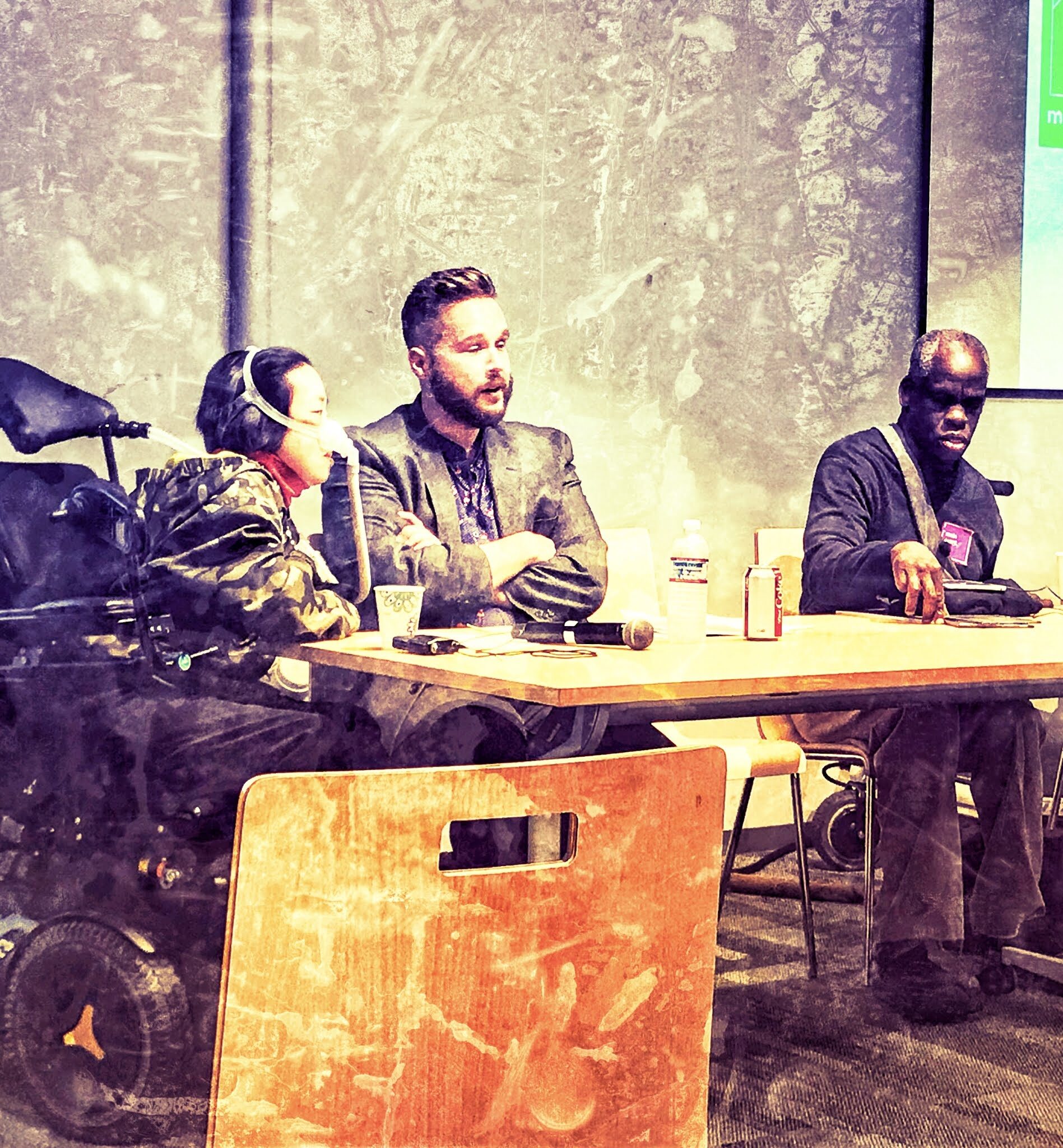Shannon Des Roches Rosa twitter.com/shannonrosa I want to make this as friendly as possible, so I think it’s important to start by clarifying terms: Inclusion, my lovelies, is a real and basic human right, and it simply means autistic and other disabled people have the right to be out and about in the world, and not segregated or hidden away as used to be the default for their community members. Inclusion does not mean forcing people like my high-support autistic son to be in places they don’t want to be, that aren’t set up for them, or in which they aren’t welcome. But even when we embrace inclusion as a disability rights baseline, my son still doesn’t get to do all the things—but that’s because of accessibility barriers, not because inclusion itself is a flawed concept. Even though The Americans with Disabilities Act (ADA) installed accessibility as the law of our…
Tag: ADA
Alice Wong, John Marble, and Leroy Moore [image: Stylized photo of an Asian-American woman with bobbed black hair, a motorized wheelchair, and a bipap mask; a white man with brown hair in an undercut and a mustache & beard; and a Black man with very short gray hair.] There are few better ways to spend the evening than at an event for inclusive housing initiative The Kelsey, in celebration of the 20th anniversary of the Olmstead decision—”the most important civil rights decision for people with disabilities in our country’s history“—with an amazing panel of disability advocates: Alice Wong, John Marble, Leroy Moore, and Micaela Connery. We were lucky enough to do just that last night, and now we’ll share what we learned with in this lightly edited transcript of our live-tweeted coverage of the event. Listening to Alice Wong of Disability Visibility Project talk (with a dash of salt) about…
Maxfield Sparrow unstrangemind.com Photo © Stephen Melkisethian | Flickr/Creative Commons [image: Black-and-white photo of disability rights protesters at the U.S. Capitol: some using wheelchairs, some not.] We educated our legislators. We wrote letters and made phone calls. We worked hard to get the message across, yet the House judiciary committee has chosen to take the next step to dismantle the Americans With Disabilities Act (ADA): H.R. 620 will go in front of the entire House of Representatives for a vote. We have no idea yet when that vote will be, so we need to renew our efforts to educate and persuade our lawmakers, so they will act to protect the ADA, and reject H.R. 620 and its agenda to confuse and limit the ADA. As I wrote back in May, “Unless we educate our legislators about the harm of notification bills like H.R. 620 and similar state-level legislation, the ADA Title…
Clarissa Kripke, MD, FAAFP odpc.ucsf.edu In this important talk for anyone concerned about their, or their child’s, long-term living arrangements and supports, Dr. Clarissa Kripke explores progress made in community living for people with developmental disabilities. She explains how California’s Lanterman Act has been enormously successful by establishing an entitlement to community-based services and supports for people with developmental disabilities of all age, and how those services work. She also discusses specific successful cases, and clears up misconceptions about which housing models work best — both financially, and for quality of life. I’m the Mom of an Autistic teen. Of course I want what’s best for him. I want him to have opportunity, stability, care, and respect. After trying to learn everything I could, I realized that wanting what’s best, and knowing how to achieve it, are two different things. Fortunately, we live in California. The Lanterman Act was developed…
The Autistic Self-Advocacy Network’s Ari Ne’eman and Steven Kapp have released a policy brief: What Are the Stakes? An Analysis of the Impact of the DSM-5 Draft Autism Criteria on Law, Policy and Service Provision [PDF]. The full PDF brief can be found at bit.ly/DSM-5, and “…summarizes the legal and policy details of the program under discussion and attempts to identify the likely implications of the DSM-5’s outlined changes in the criteria for Autism Spectrum Disorder on eligibility, benefits, and access to services and legal rights.” The legal and policy areas in question are described, then followed by analyses of the proposed DSM-5 changes’ implications: Individuals with Disabilities Education Act (eligibility criteria) Impact of DSM-5 Shifts on Students with Disabilities Receiving Services Under IDEA ADA/504 Accommodations (guaranteeing non-discrimination re: disability in schools and in the workplace) Impact of DSM-5 Shifts on ADA/504 Protections Medicaid-Funded Developmental Disability Services Impact of the…
Shannon Des Roches Rosa www.ThinkingAutismGuide.com Psychiatric survivors during a protest in 1976 Lives Worth Living is a new documentary on the history of the American Disability Rights movement, specifically the critical years from World War II to the signing of the Americans With Disabilities act (ADA) in 1990. It is a necessary, unapologetic, inspiring, instructive, and far-too-short film that could easily beome a series — so many important people interviewed, so many topics covered, so quickly. (For those who want to dig deeper, the Lives Worth Living site includes an interactive timeline of international Disability Rights, and a list of interviewees.) Viewers are given no opportunity to adopt the too-common patronizing perspective towards the disability rights activists in the film — there’s no time, these people have urgent stories to tell about themselves and their movement’s history. Some subjects reject pity outright, as when Ann Ford tells how it felt…
Elise, A.K.A. aspergers2mom asd2mom.blogspot.com We have all heard the stories. That mother who just won’t listen when administrators talk about her child, the parent they delegitimize because she got frustrated and yelled at them, the one who thinks she knows her child best. So what do you do if you are faced with a problematic situation? How do you channel your frustrations to get your child the services they need? It wasn’t until I was in my forties that I learned that you need to do what you need to do for your kids — who cares what others think? This is what I call “embracing your inner bitch.” Now, embracing your inner bitch is a good thing. You use your frustration and your anger to motivate you, but you do so in a way that is calm, intelligent, and very thought-out. You leave the yelling and the kvetching…



